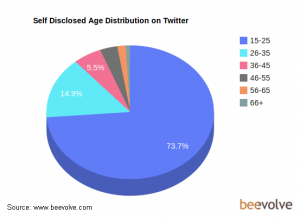If you had to guess the typical teenager’s worst nightmare, what would it be: not getting a date to Prom? Failing a big test? How about Grandpa commenting about the family reunion on his granddaughter’s funny Facebook status? With the advent of social media, teens and adults have more opportunities than ever to stumble into each other’s’ digital worlds, resulting in a fair share of awkward situations.
If you were to ask an 18-year-old and a 45-year-old what Facebook is used for, you would probably get two very different answers. The fact is that different age groups have entirely different purposes for using social media, resulting in differences in the unspoken code of “social media etiquette”. Most young people wouldn’t dare to start a private conversation in the comments of a photo or status, but older users seem perfectly content to ask about family or how school is going over a photo of a group of friends at prom. Whereas adults typically enjoy posting status updates on family matters or funny stories from their day, their juniors tend to limit broadcasts to whatever will impress their myriad of “friends”: from a shining moment at a sports game to the latest vacation.
Social media users are becoming increasingly aware of this generation gap, and the results are interesting to say the least. In recent years, Facebook has become more accessible to a wider range of age groups. The average age of Facebook users went from 38 to 41 from 2010 to 2012. In 2012, 72% of U.S. mothers had Facebook accounts – compared with only 50% in 2010. And the number one complaint that teenage users have against Facebook is “My parents have joined!”
So what are young people doing about this concern? It seems that they have decided to simply leave Facebook. The site’s US active users plummeted by 7.37% from October 2012 to April 2013. Meanwhile, Twitter is becoming the new social media destination for young people: 73.7% of Twitter users are age 15 to 25. Naturally, this new hub is attractive to America’s youth, allowing them to communicate more exclusively with their peers. Some are also drawn purely by the lack of adults: on Twitter, they feel they have the freedom to post taboo topics that could get them into trouble on adult-populated Facebook, opening up possibilities for cyber-bullying or talk of underage drinking and partying.
What does this mean for the future of social media? It seems likely that Twitter will go down the same route as Facebook, widening the age group of its audience as parents flood the site in the hopes of policing their children’s online activity. In that case, the question is which website will act as the next digital refuge for US youth: sites like Tumblr and Instagram are prime candidates. Only time will bring the answers, but until then, teens and adults will have to play nice on their shared social venues – even when Grandpa loses you some likes.
Statistical data compiled from:
http://www.beevolve.com/twitter-statistics/
http://socialmediatoday.com/rtmixmktg/1392791/are-teenagers-abandoning-facebook-infographic
http://smallbusiness.chron.com/breakdown-facebook-users-age-63280.html



